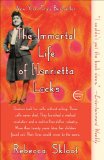Summary | Excerpt | Reading Guide | Discuss | Reviews | Beyond the Book | Readalikes | Genres & Themes | Author Bio

Under the microscope, a cell looks a lot like a fried egg: It has a white (the cytoplasm) that’s full of water and proteins to keep it fed, and a yolk (the nucleus) that holds all the genetic information that makes you you. The cytoplasm buzzes like a New York City street. It’s crammed full of molecules and vessels endlessly shuttling enzymes and sugars from one part of the cell to another, pumping water, nutrients, and oxygen in and out of the cell. All the while, little cytoplasmic factories work 24/7, cranking out sugars, fats, proteins, and energy to keep the whole thing running and feed the nucleus. The nucleus is the brains of the operation; inside every nucleus within each cell in your body, there’s an identical copy of your entire genome. That genome tells cells when to grow and divide and makes sure they do their jobs, whether that’s controlling your heartbeat or helping your brain understand the words on this page.
Defler paced the front of the classroom telling us how mitosis—the process of cell division—makes it possible for embryos to grow into babies, and for our bodies to create new cells for healing wounds or replenishing blood we’ve lost. It was beautiful, he said, like a perfectly choreographed dance.
All it takes is one small mistake anywhere in the division process for cells to start growing out of control, he told us. Just one enzyme misfiring, just one wrong protein activation, and you could have cancer. Mitosis goes haywire, which is how it spreads.
“We learned that by studying cancer cells in culture,” Defler said. He grinned and spun to face the board, where he wrote two words in enormous print: HENRIETTA LACKS.
Henrietta died in 1951 from a vicious case of cervical cancer, he told us. But before she died, a surgeon took samples of her tumor and put them in a petri dish. Scientists had been trying to keep human cells alive in culture for decades, but they all eventually died. Henrietta’s were different: they reproduced an entire generation every twenty-four hours, and they never stopped. They became the first immortal human cells ever grown in a laboratory.
“Henrietta’s cells have now been living outside her body far longer than they ever lived inside it,” Defler said. If we went to almost any cell culture lab in the world and opened its freezers, he told us, we’d probably find millions—if not billions—of Henrietta’s cells in small vials on ice.
Her cells were part of research into the genes that cause cancer and those that suppress it; they helped develop drugs for treating herpes, leukemia, influenza, hemophilia, and Parkinson’s disease; and they’ve been used to study lactose digestion, sexually transmitted diseases, appendicitis, human longevity, mosquito mating, and the negative cellular effects of working in sewers. Their chromosomes and proteins have been studied with such detail and precision that scientists know their every quirk. Like guinea pigs and mice, Henrietta’s cells have become the standard laboratory workhorse.
“HeLa cells were one of the most important things that happened to medicine in the last hundred years,” Defler said.
Then, matter-of-factly, almost as an afterthought, he said, “She was a black woman.” He erased her name in one fast swipe and blew the chalk from his hands. Class was over.
As the other students filed out of the room, I sat thinking, That’s it? That’s all we get? There has to be more to the story.
I followed Defler to his office.
“Where was she from?” I asked. “Did she know how important her cells were? Did she have any children?”
“I wish I could tell you,” he said, “but no one knows anything about her.”
After class, I ran home and threw myself onto my bed with my biology textbook. I looked up “cell culture” in the index, and there she was, a small parenthetical:
Excerpted from The Immortal Life of Henrietta Lacks by Rebecca Skloot Copyright © 2010 by Rebecca Skloot. Excerpted by permission of Crown, a division of Random House, Inc. All rights reserved. No part of this excerpt may be reproduced or reprinted without permission in writing from the publisher.
If there is anything more dangerous to the life of the mind than having no independent commitment to ideas...
Click Here to find out who said this, as well as discovering other famous literary quotes!
Your guide toexceptional books
BookBrowse seeks out and recommends the best in contemporary fiction and nonfiction—books that not only engage and entertain but also deepen our understanding of ourselves and the world around us.